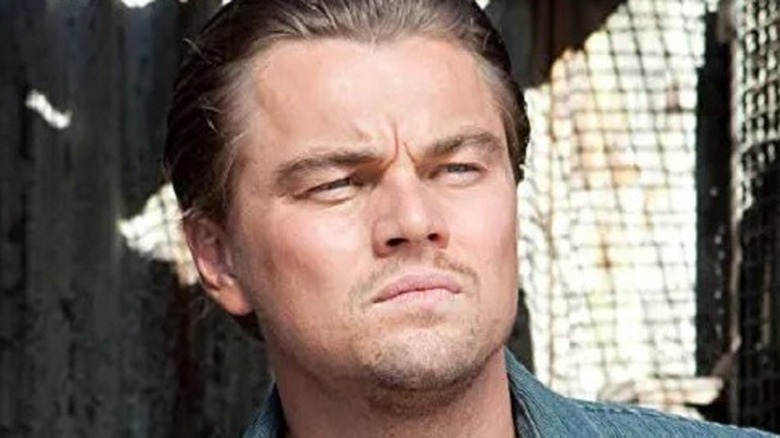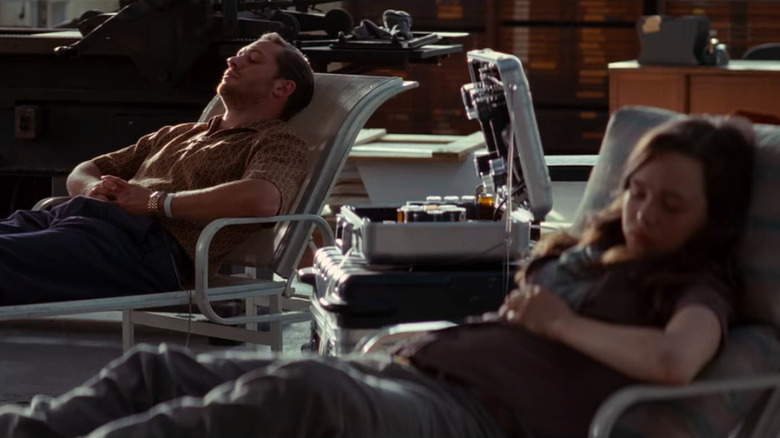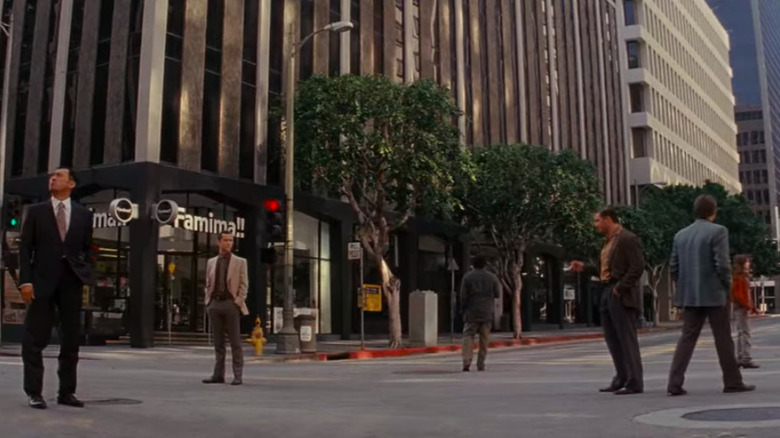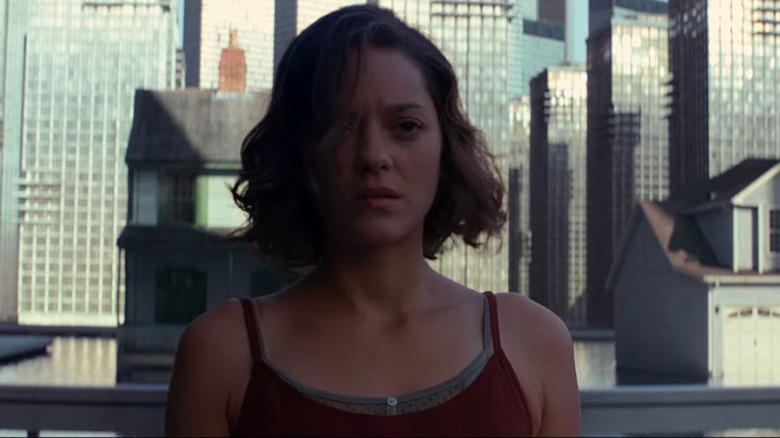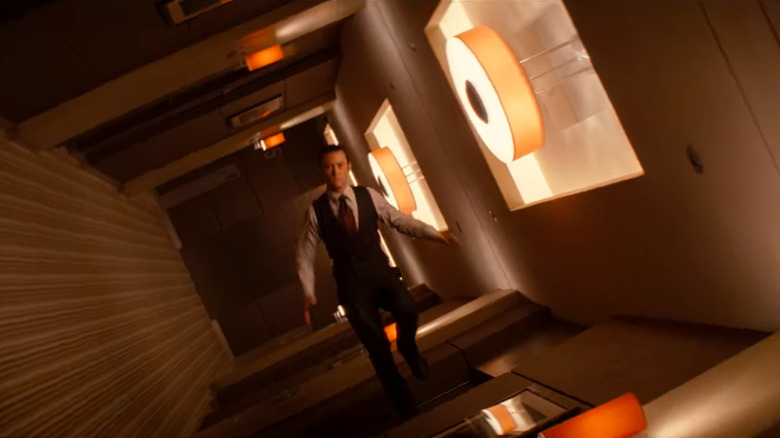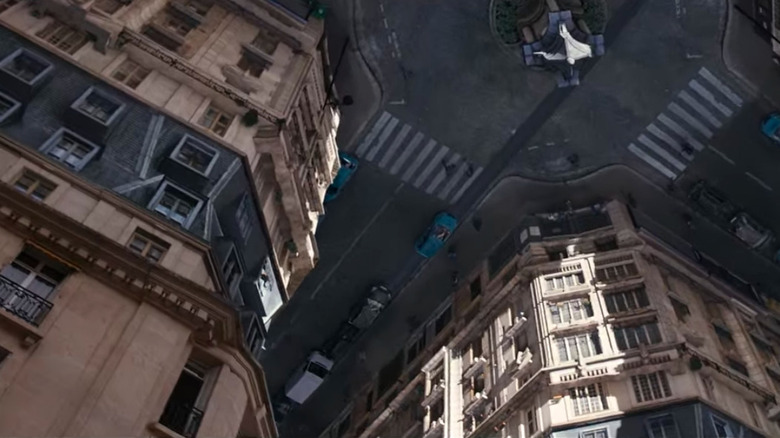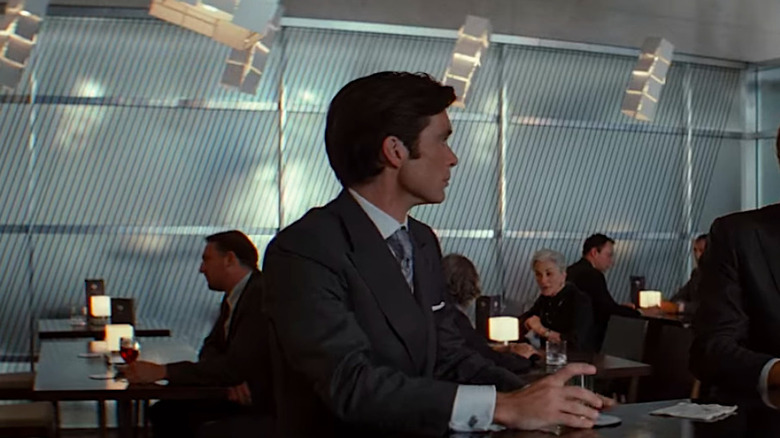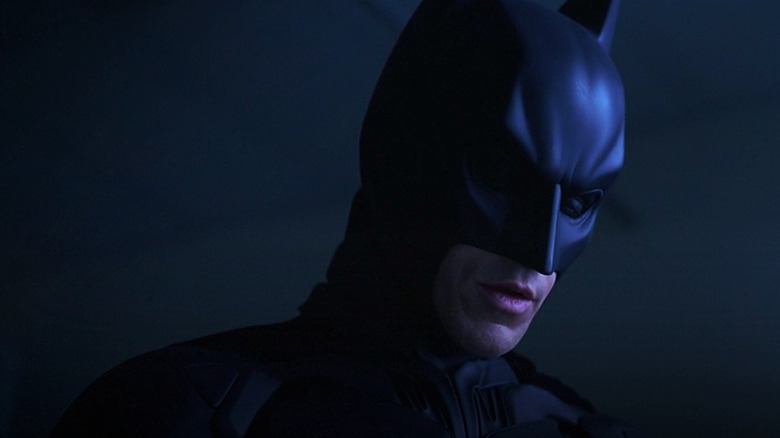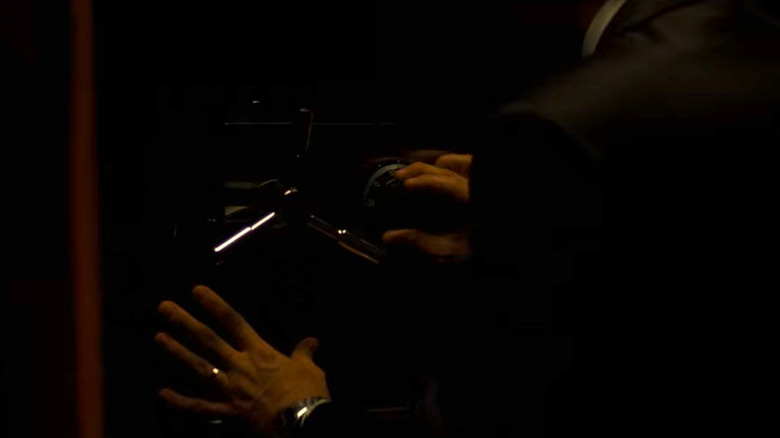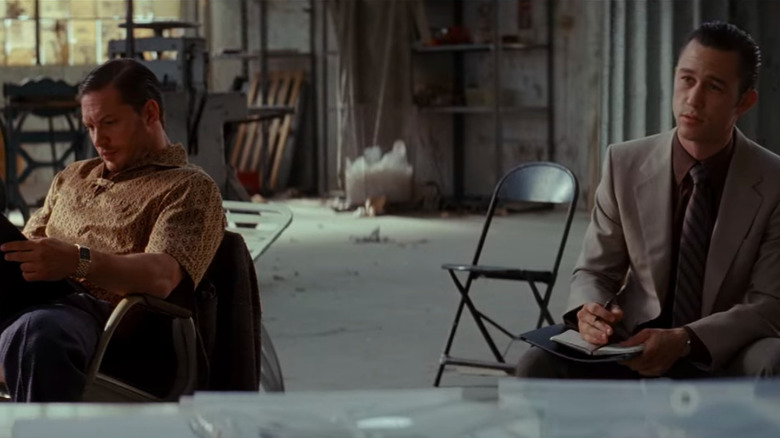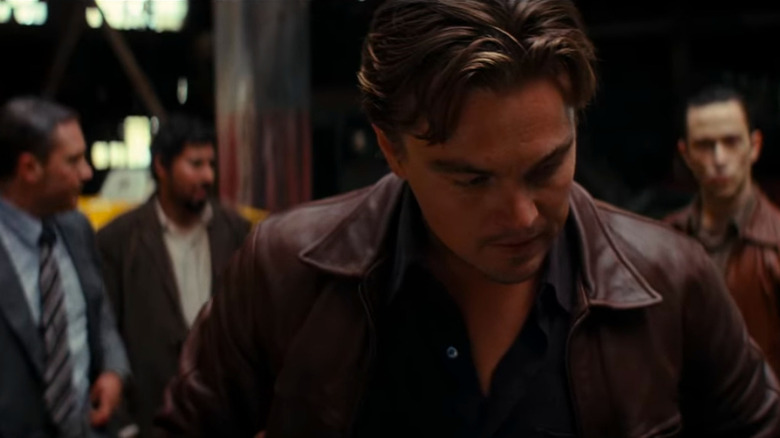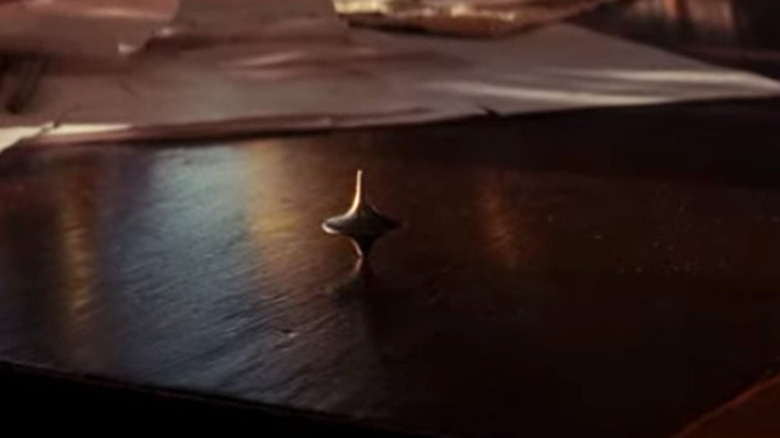6 Best And 6 Worst Things In Inception
When Christopher Nolan's mesmerizing fever dream "Inception" was released in 2010, it quickly implanted itself in the pop culture collective subconscious. Today, it's still one of the most memorable sci-fi films of all time, with many feeling the same fondness and fascination for it that they did when it first premiered. Set in a world where it's possible to enter others' dreams, the movie centers on Leonardo DiCaprio's Dom Cobb, who makes his living extracting secrets from snoozing minds for corporate clients.
However, Cobb's mind is hiding plenty of secrets. too, including his grief over what happened to his dead wife Mal (Marion Cotillard) and his guilt over leaving the country — and his children — to avoid arrest. So when business tycoon Saito (Ken Watanabe) offers to clear Cobb's criminal record if he can infiltrate the mind of Robert Fischer (Cillian Murphy), the CEO of his corporate competitor, and implant an idea — the inception in the title — Cobb agrees to make the nearly impossible mission his final job.
What follows is a dizzying experience full of mind-boggling exposition and nail-biting action in such strange circumstances that it's impossible not to get drawn into the film's unique world. Yet, while there are plenty of things to enjoy and appreciate about "Inception," it also has several noteworthy flaws. Here are six of the best and six of the worst things in "Inception."
Worst: The convoluted concept of shared dreaming
"Inception" never specifies when it takes place, and unlike many contemporary sci-fi stories, the characters are blissfully free of handheld devices and other futuristic technology. The one advanced technology they do have is the means to infiltrate and influence others' dreams, a capability so odd it doesn't seem so much futuristic as simply part of the movie's alternate reality. While it would be easy enough to accept it at face value, "Inception" spends much of its lengthy runtime explaining how dream manipulation works and fleshing out the plan to perform inception on Fischer's unconscious mind.
It's a plan that involves several dream "levels," each of which seems progressively longer to the dreamers, as well as the danger of dropping into limbo, a space of unending subconsciousness. If that weren't enough, what happens on previous levels can impact subsequent levels, levels must be traversed in order, and someone is tasked with waking everyone up at each level, making for a remarkably convoluted scenario.
Plus, the premise of inserting an idea into Fischer's dreaming mind in itself is odd. The team's goal is to make Fischer believe he should break up his company, but even now there are ways to manipulate people's minds into adopting ideas they might not otherwise consider that require far less effort than entering their dreams. The concept of shared dreaming makes "Inception" fascinating, but it's also so complicated and full of caveats that it's often frustrating and confusing.
Best: The talented cast
"Inception" features an impressive roster of talented actors who help elevate the film. The cast is led by Oscar-winner Leonardo DiCaprio, and there are plenty of other big names in the ensemble, including Ken Watanabe, Marion Cotillard, Joseph Gordon-Levitt, Elliot Page, and Cillian Murphy. Even Michael Caine turns up for a couple of scenes as Cobb's father-in-law. Plus, while he had already been working as an actor for almost a decade, "Inception" brought Tom Hardy to widespread fame, ahead of his popular turn as Eddie Brock in 2018's "Venom" and its 2021 sequel.
There is not a weak link in the bunch, and it's a good thing, given the actors are often what make the film's long sequences of exposition watchable. The rivalry between Gordon-Levitt's somber Arthur, Cobb's partner, and Hardy's live-wire Eames, a "forger" Cobb enlists for their big job, gooses the team's brainstorming and experimentation. Meanwhile, Page's Ariadne, a gifted student who becomes the team's architect, frequently faces off with Cobb over the demons he's hiding from the rest of the group, injecting some humanity into the story.
Worst: The lack of women characters
Of the many characters in "Inception," woefully few are women. Worse, the movie doesn't serve the ones it includes very well, either, particularly when it comes to Mal. Mal's very name translates to "bad," and throughout most of "Inception," that's exactly what she is. She's a thorn in Cobb's and his team's sides and an overwhelming emotional burden to him to boot. In addition, for much of the film, we don't even see the real character, just the dream version Cobb constructs, and he eventually admits she doesn't hold a candle to the real woman. The real Mal lost her grip on reality and framed Cobb for murder in a misguided attempt to force him to leave what she believed was a dream world.
Cobb is punishing himself by conjuring Mal in his dreams, but it's hard to understand why his version of her is so awful. Given the way she's portrayed, it's a relief when he finally lets her go. However, the fact that Mal functions as one of Cobb's biggest obstacles throughout the film is indicative of just how poorly "Inception" treats its leading ladies.
Best: The mind-bending action
"Inception" is filled to the brim with action. While it seems like people's dreams should be peaceful and playful, in the movie's world, they're places of deadly intrigue. The gun fights, car chases, and battles in the snow that occur throughout the film are generally exciting and well-edited, and since the characters are usually racing against time for one reason or another, they also tend to be real nail-biters. But there's one extended action sequence that eclipses all the rest of the film's whiz-bang moments: the rotating hallway fight sequence.
The scene focuses on Arthur as he fights off Fischer's subconscious projections in a hotel hallway. Yet, during the battle, which takes place in the second level of the dream Cobb and his team have planned, the van carrying the team on the first level falls down an embankment. Because one level of the dream impacts the others, that starts the hallway rotating, leaving Arthur and the projections to continue their battle as the laws of gravity fly out the window.
What's especially amazing about the sequence is that it was created entirely with practical effects, which required the filmmakers to build sets that could really spin. The amount of work required to make it all come to life on-screen paid off in a scene that's not only one of the most memorable in the film but one of the most memorable in filmmaking history.
Worst: The story downplays emotion
Cobb is a man haunted by big emotional issues, but he keeps most of them locked up tight throughout the film, which is something the other characters do as well. In general, the characters barely react to their circumstances. Even Arthur remains stone-faced as he fights off bad guys in that rotating hallway.
The characters' lack of emotion and overwhelming seriousness is in keeping with the tone of "Inception." Nolan's script comes across as deeply interested in the intellectual concepts and ideas the movie explores, but the emotions any of it might evoke — from awe to fear to excitement — is an afterthought. Only Hardy manages to inject even the slightest bit of levity into the proceedings.
Then there's Cobb and Mal's tragic love story. It should be the emotional center of the film but Mal is painted in such broad, negative strokes that it's hard to truly empathize with Cobb's loss. Moreover, DiCaprio barely betrays any emotion over Mal until well into the film, and by then, it's too little, too late. This makes for a story that's wrapped in a thrilling package but fails to resonate in a deep, meaningful way.
Best: The fascinating visuals
One of the things that makes a movie about dreams especially fun is seeing how the dreamscapes are brought to life. In "Inception," this is illustrated in a scene where Cobb explains how the dream world's environment can be manipulated to Ariadne. At first, everything appears to be normal, but then Cobb asks Ariadne to remember the steps it took to get there. When Ariadne can't recall, cars and windows explode as the character realizes they are sharing a dream as they speak.
Once Ariadne understands where they are and that nothing has to be exactly as it seems, the character uses the opportunity to modify their surroundings, and in an eye-popping sequence, literally folds the city in half. It's one of the most wondrous moments in the film and thoroughly establishes the magic that can occur in dreams. That wonder continues when Arthur introduces Ariadne to the M.C. Escher-esque infinite staircase in a subsequent scene. In these sequences, we feel the same thrill that Ariadne does at the "pure creation" that can take place in the subconscious mind.
Worst: The movie's dreams are too logical
There are some spectacular visuals early in "Inception" that demonstrate the creative ways its dreamscapes can defy the laws of physics. Unfortunately, the dreams Cobb and his team actually work in are far less enchanting. In fact, outside of minor touches like glasses tilting at odd angles, the movie's dreams mostly seem just like reality.
As Cobb points out, although dreams feel real when we're having them, when we're awake we realize they're full of irrational scenarios and strange settings. That's why we're so intrigued by our dreams. However, despite the plot's nods to the inherent oddity of dreams, "Inception" doesn't successfully maintain that strangeness. Instead, its dreamscapes are extremely logical with rational causes and effects and lucid motivations and situations. The lack of noteworthy surreal touches in the movie's dream environments is a lost opportunity to make the story even more intriguing.
Best: It's not based on existing IP
Today it seems there's barely a movie that's released that isn't based on existing intellectual property. The Marvel Cinematic Universe, based on Marvel Comics, is amongst the most popular ongoing movie franchises around, and movie studios are constantly reviving, rebooting, or reimagining existing titles, from Steven Spielberg's take on "West Side Story" to Tom Cruise's smashing new sequel to "Top Gun." While Nolan had already made several original films before "Inception," he wasn't immune to the pull of existing intellectual property either. Indeed, Nolan was catapulted to fame when he helmed 2005's "Batman Begins," the first film in his "Dark Knight" trilogy.
Nolan made "Inception" between 2008's "The Dark Knight" and 2012's "The Dark Knight Rises," the second and third films in the series, and the popularity of those films undoubtedly made it easier for "Inception" to find an audience. However, "Inception" was also a breath of fresh air because it was a completely original story, a rarity for risk-averse Hollywood. These days, movies with original stories are often relegated to the independent scene. Nolan, however, had enough clout to make a big-budget film that didn't already have a built-in audience due to the availability of its story in another format. It's one of the many things that makes "Inception" so singular.
Worst: The plot is fairly conventional
Although the story of "Inception" is entirely original, at its core, it's arguably a riff on a plot line that dozens of other movies have used before: the "one last job" heist. While it's dressed up in fancy, head-trippy clothes, Cobb's desire to take on a final job before getting out of the dream information-stealing business and returning to his family without the threat of arrest hanging over him is actually fairly conventional.
Moreover, even though Cobb and Arthur's work delving into others' unconscious minds seems exotic, what they're doing is simply a form of corporate espionage — a crime that often comes up in the movies, even if the ways it's carried out are usually more grounded in reality. As a result, although "Inception" is often thought of as one of the most unique movies in recent memory, it turns out the plot is actually stitched together from the same conventional material as many other thrillers and crime films.
Best: The intriguing storytelling encourages viewers to find their own meaning
Plenty of movies are critically acclaimed and even box office winners, but are barely remembered after viewers leave the theater. In contrast, ever since its initial release, viewers have returned to "Inception." While there are many reasons for this, one of the biggest may be that it captured audiences' imaginations in a way few movies before or after have.
The film doesn't go out of its way to delve into specific themes or metaphors, and, as a result, viewers are left to draw their own conclusions. Plus, the dream-within-a-dream-within-a-dream plot means audiences take nothing at face value, provoking debates over what in the story is real, what isn't, which events happened, and which are fantasy.
Even today, fans continue to come up with new theories and extract new meanings from the film. This has ensured "Inception" still feels fresh and relevant to the pop culture conversation, which has resulted in fans watching it again and again.
Worst: Outside of Cobb, the characters are one-dimensional
Over a half dozen characters play a major role in the story of "Inception," yet outside of Cobb, we get to know next to nothing about any of them. Instead, they're mostly there to deliver explanations and execute the movie's dream heist. Consequently, characters like Arthur, Eames, and Yusuf feel less like people and more like chess pieces getting moved around a board while delivering (often very clunky) dialogue.
This is surprising since the movie spends so much time filling in Cobb's backstory, including his wife's tragic death, his separation from his kids, and the reason he knows an idea can be implanted into someone's subconscious during a dream. Yet, most of this is revealed because Ariadne takes an interest, even though that interest seems to largely be driven by the fact that Cobb doesn't seem all that stable, and as a result, might endanger the rest of the team.
Otherwise, Ariadne and the other characters appear entirely uninterested in getting to know one another, a stance the movie shares. We never get any information about, for example, how anyone outside of Ariadne got into dream sharing, how Cobb and Arthur became partners, or how Eames knows the pair. So while the movie goes out of its way to explore Cobb's background and motivations, the other characters aren't given the same attention, causing them to come across as little more than ciphers.
Best: The open-ended conclusion
Many people hate stories with ambiguous endings, and those people were no doubt left frustrated by the open-ended conclusion of "Inception." However, those final moments put the cherry on top of the movie's mind-twisting sundae. When Cobb finally returns home, he spins the top that used to be Mal's totem. The movie explains early on that if the top doesn't stop spinning, it's a dream, but if it does, it's reality. It's a handy way to make sure a dreamer doesn't lose touch with what's real. However, when Cobb sees his children, he goes to them instead of waiting to see if the spinning top falls, leaving the audience to watch and wonder as the film ends before a definitive conclusion is delivered.
That final moment of ambiguity creates one of the most memorable scenes in a film that's full of them while provoking more theorizing and speculation than any other part of the story. Moreover, the ending is in keeping with everything that comes before it. By refusing to deliver a simple answer in the conclusion, Nolan maintains the mind-blowing impact of much of the rest of the movie, while at the same time indicating that, in Cobb's mind, it ultimately doesn't matter if he's in a dream or reality as long as he's with his kids, the people he most wants to be with in the world.
